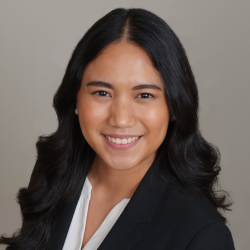Embracing Health Policy in Residency

ACP Health Policy Intern, 2022
Georgetown University Hospital
Internal Medicine-Pediatrics, PGY-3
As resident physicians, it is easy to push through each day with our heads down, caught up in the long hours at the hospital and the vast amounts of knowledge we need to learn. When we get an admission, the clock starts: we must quickly complete our evaluation before starting one of the nine other admissions we may get during the shift. We must balance obtaining the patient’s history of present illness, completing the medication reconciliation, staffing with an attending, and calling consults while covering our other patients and supervising interns and medical students.
Sometimes we are so focused on trying to figure out what is wrong with a patient that we forget to ask why they became sick. At other times, we focus on patient care and forget about the barriers in the health care system that affect our own practice of medicine—barriers known to contribute to physician burnout and dissatisfaction with the medical field.
I would encourage all residents to learn the basics of health policy. We do not need to be policy gurus, but we should know the basics of how policies affect the environment in which we practice, just as we learn the physiology behind diseases to better understand how patients could decompensate due to their disease process.
As we learn more about the health care system, we can frame health policies in the context of what we see every day, noting the barriers our patients face and those we experience in our own practice. These stories, as we saw during ACP’s Leadership Day, allow policymakers to visualize how policies affect patients—their constituents—and can even bridge political differences.
We must also remember that change can be slow. Advocacy, like motivational interviewing, is a process. It takes persistence. It takes relationship building. It takes time.
As you progress through your medical career, I want to encourage you to pause from time to time and look up. Make note when a patient’s disease isn’t controlled due to the inability to afford medication, when you see a disproportionate increase in a disease in your community, or when you spend more time on paperwork than with your patients. Too often our patients’ stories and our own are lost in policy discussions. We need to be that voice for our patients and each other.
10 Tips for Applying to the ACP Health Policy Internship Program

ACP Health Policy Intern, 2022
University of Maryland School of Medicine
Graduating Class: 2022
The ACP Health Policy Internship Program has been one of the most memorable experiences in my medical training. I learned about the landscape in which I will practice medicine and about how ACP can help advocate for my professional well-being through writing and implementing policies at various levels of government. In this article, I will share 10 tips for creating a successful application for the internship so that hopefully you may also receive this rewarding opportunity in the future.
What: The ACP Health Policy Internship Program is a month-long, paid, health policy internship for medical trainees during which interns will meet with organization leadership; research and analyze current health policies; write policy memos; attend congressional hearings, meetings, and fundraisers; and lead the ACP Leadership Day briefing for medical trainees.
- Tip #1: Do not worry nor be intimidated if this will be your first experience working in health policy. Prior experience in policy or government work is not required to apply. Just be sure to demonstrate your strong interest in policy and advocacy, which can take many forms (for example, coursework, research, volunteering, and so forth).
Why: Medicine can go far in healing people, but policy can go to places where medicine cannot reach. Through my past experiences with organized medicine, I learned that I could potentially create systemic, long-term changes that tackle the root causes of health disparities. I applied to the health policy internship to gain more experience in legislative advocacy at the federal level.
- Tip #2: When you write your personal statement, be sure to include how your experiences led to your personal reasons for applying. Is it to fill in knowledge or experience gaps? Is it to grow a network in Washington, DC? Is it to improve your writing and public speaking skills? Is it to advance an ACP policy that you are passionate about?
Who: The Health Policy Internship Program accepts one medical student and one resident. You will work with researchers and writers from the Health Policy team, lobbyists from the Legislative Affairs team, and policy analysts from the Regulatory Affairs team. In addition, you will meet with the President, CEO, and Board of Regents of ACP leadership, and countless physicians in all fields of internal medicine through committee meetings.
- Tip #3: Mention your interest in this health policy internship to your attending physician in your school or program: you may learn that they know your state’s ACP Governor and could give a warm introduction. I learned that ACP connects so many physicians together from across the United States and the world.
When: The application timeline opens in September and closes in late October; decisions come out in late December. The actual month-long internship usually happens in May to coincide with ACP Leadership Day. The hours of the internship are flexible and depend on your tasks, but generally, the day runs from 9:00 a.m. to 5:00 p.m.
- Tip #4: If you are on a more intense rotation, consider completing your application ahead of time or working on it for 30 minutes every day until you finish. I worked on my application during the weekends on an elective month. If you are a resident, your program may need to confirm that you can do away with electives during the selected month so start the conversations well in advance.
Where: The office is in Washington, DC, near Union Station. It is located near the Red, Green, and Yellow Metro lines. Since the office is currently operating in a hybrid model, you may come into the office for about 3 days a week and have Zoom or Teams meetings on the other days. While you are in the office you may wear business casual attire, but when you are attending external events as a representative of ACP you will be expected to wear business professional attire.
- Tip #5: Once you are accepted, you can start looking for summer sublets a month before your move date. You may use online marketplaces like Craigslist, college housing and sublet Facebook groups, or short-term platforms like Airbnb. You may consider living with family members as well. Please be wary of scammers as it will be a popular time for people moving in and out of Washington, DC.
- Tip #6: Pack two blazer jackets: one that you can keep in your cubicle and another that you can keep in your home. This will allow you to have a jacket handy in case there are any external meetings to attend during the day. Also, bring comfortable walking shoes! DC has so many museums and attractions to explore in your time off while you are here.
How: To apply, you will need an updated curriculum vitae (CV), letters of recommendation from your ACP Governor and your school or program, a personal statement, and a legislative essay.
- Tip #7: Make sure that your CV is legible and neat. Perhaps consider the tasks you will be doing during this internship and reorganize your experiences to show your ability to be professional, analyze information, and write. Share your CV with your school or program’s writing center and have a mentor review it before you submit.
- Tip #8: As soon as you can, schedule a meeting with your state’s ACP Governor to get a letter of recommendation. I brought to the meeting my updated CV and a list of ACP events I had attended over the past few years. During the meeting, we discussed my interest in the policy internship, I received advice for writing my personal statement, and we discussed next steps and deadlines.
- Tip #9: To create a personal statement with substance, gather your thoughts and brainstorm what you want to include for 1 to 2 weeks before you start writing. Be sure to keep your sentences concise and to the point and have your school or program’s writing center and your mentor review it before you submit.
- Tip #10: For the legislative essay, you can write about any topic: perhaps consider writing a policy memo on an existing ACP policy or topic that you are passionate about. A policy memo is a document with a policy ask for a member of Congress and includes relevant background information, what the government has already done about it, ACP’s position on it, and the policy ask. You may cite your evidence using footnotes. Keep in mind that the audience is usually people determining policy around a topic they may not be familiar with. The goal of this task is to see that you can write an evidence-based essay with appropriate grammar and punctuation.
I hope that this was helpful, and I wish you all the best in your application. Regardless, please continue to advocate for yourself and your patients through all avenues possible because we need your medical voice in policy.

